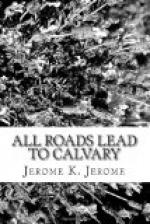He thought it the tragedy of the world that Rome had conquered Greece, imposing her lower ideals upon the race. Rome should have been the servant of Greece: the hands directed by the brain. She would have made roads and harbours, conducted the traffic, reared the market place. She knew of the steam engine, employed it for pumping water in the age of the Antonines. Sooner or later, she would have placed it on rails, and in ships. Rome should have been the policeman, keeping the world in order, making it a fit habitation. Her mistake was in regarding these things as an end in themselves, dreaming of nothing beyond. From her we had inherited the fallacy that man was made for the world, not the world for man. Rome organized only for man’s body. Greece would have legislated for his soul.
They went into the drawing-room. Her father asked her to sing and Arthur opened the piano for her and lit the candles. She chose some ballads and a song of Herrick’s, playing her own accompaniment while Arthur turned the leaves. She had a good voice, a low contralto. The room was high and dimly lighted. It looked larger than it really was. Her father sat in his usual chair beside the fire and listened with half-closed eyes. Glancing now and then across at him, she was reminded of Orchardson’s picture. She was feeling sentimental, a novel sensation to her. She rather enjoyed it.
She finished with one of Burns’s lyrics; and then told Arthur that it was now his turn, and that she would play for him. He shook his head, pleading that he was out of practice.
“I wish it,” she said, speaking low. And it pleased her that he made no answer but to ask her what he should sing. He had a light tenor voice. It was wobbly at first, but improved as he went on. They ended with a duet.
The next morning she went into town with them. She never seemed to have any time in London, and wanted to do some shopping. They joined her again for lunch and afterwards, at her father’s suggestion, she and Arthur went for a walk. They took the tram out of the city and struck into the country. The leaves still lingered brown and red upon the trees. He carried her cloak and opened gates for her and held back brambles while she passed. She had always been indifferent to these small gallantries; but to-day she welcomed them. She wished to feel her power to attract and command. They avoided all subjects on which they could differ, even in words. They talked of people and places they had known together. They remembered their common love of animals and told of the comedies and tragedies that had befallen their pets. Joan’s regret was that she had not now even a dog, thinking it cruel to keep them in London. She hated the women she met, dragging the poor little depressed beasts about at the end of a string: savage with them, if they dared to stop for a moment to exchange a passing wag of the tail with some other little lonely




